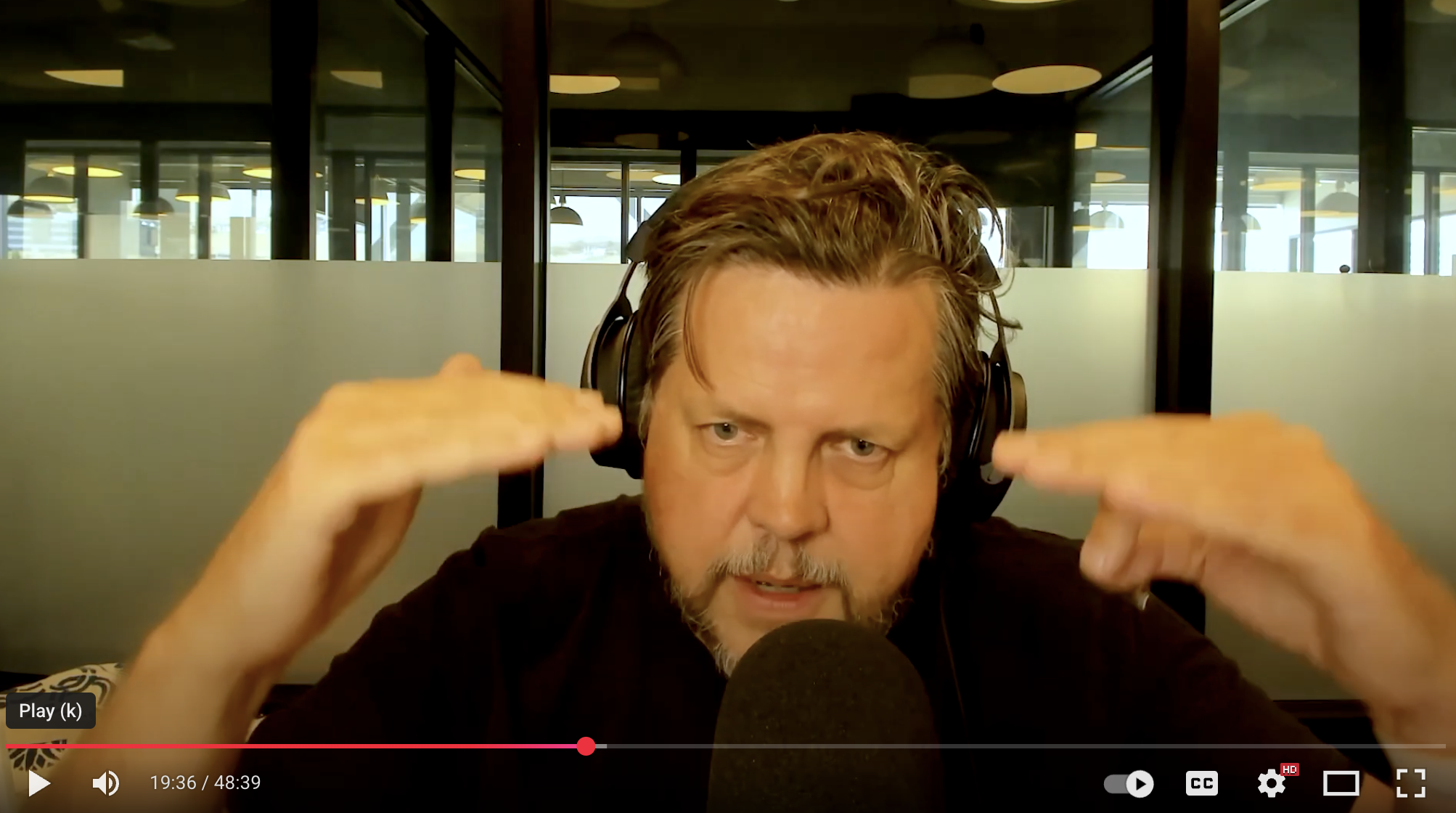Relearning the Song: Why Your CTO Playbook Keeps Expiring

I was what felt like hours into my a conversation with Joel Beasley when he dropped something that made me stop mid-sentence.
"You gotta relearn the song," he said.
He was talking about John Mayer having to constantly relearn his own songs because you can only keep so many in active memory at once. But he wasn't really talking about music. He was talking about the thing that's been haunting me for six years now—why does what worked brilliantly yesterday completely fail today?
And more painfully: why do I feel like I should already know how to fix it?
The Failure That Changed Everything
Let me take you back to 2019. COVID just hit. I'd built this framework called "The Four T's" (Tech, Team, Timing, Tools) that had gone mini-viral in our little CTO world. I was Mr. CTO. I had the YouTube videos. I had the framework. I had it figured out.
Then I joined a company as CTO and promptly botched everything.
I mean everything. Failed release. Depleted team. Couldn't deliver on the CEO's growth objectives. I was working 48-hour days trying to be the Four T's guy, focusing on the technology, investing in the team, helping with timing, refining our tooling.
And I was completely missing the point.
The CEO kept saying "growth" and "new markets" and "enhanced features." What I heard was "hire more engineers" and "upgrade the stack." I wasn't managing to business objectives. I was just being a tech dude.
That's when I realized: I wasn't actually being a CTO. I was operating at a secondary level.
The Real Job Nobody Tells You About
Here's what Joel and I unpacked in that conversation: the person writing your paycheck doesn't care about your framework. They care about whether you understand how the business actually grows.
You can be doing everything "right"—everything the books say, everything that worked at your last company, everything the CTO of Verizon told you to do—and still be completely out of sync with what your CEO actually needs.
It's like being right in your marriage while losing the relationship. Congratulations, you're technically correct and also single.
This realization led me to what I now call the Four Sentinels—Speed, Stretch, Shield, and Sales. Not as a replacement for technical excellence, but as a tier up:
- Speed: Delivering at optimal velocity (you never escape this)
- Stretch: Understanding organizational constraints before promising anything
- Shield: Protecting IP and managing internal/external threats
- Sales: Facilitating cross-functional understanding of what you're building
But even that's not the full picture.
Why We Wrote "Liquid" Instead of Another Framework Book
I was going to write a CTO Levels book. That was the plan. Levels had been transformative for hundreds of organizations. It was my precious, my pride and joy.
Then Kathy Keating and Scott Graves challenged me: "People are going to ask why they should care about another framework."
They were right. The world doesn't need more frameworks. It needs to understand why organizations behave the way they do—why the same approach that worked at 20 people explodes at 50, why hiring that brilliant Apple engineer somehow broke everything, why you feel paralyzed when you have wide-open time with nothing pressing.
That's complex adaptive systems at work.
Liquid (coming August 19th) is about understanding the state of your organization:
- Frozen: Strangled by overregulation, bad habits, excessive process
- Liquid: Healthy, adaptive, delivering value
- Boiling: Chaos, anything goes, no guardrails
Most struggling CTOs aren't dealing with bad people. They're dealing with a system that's become frozen or is boiling over. And they're trying to solve it with personnel changes instead of understanding the underlying dynamics.
The Financial Savvy Gap
Joel noticed something I've been seeing for years: the biggest gap in CTO capabilities isn't technical. It's financial.
When I can walk into a C-suite meeting and say "I can reduce COGS by $20M with a $1M investment in DevOps resources, which directly impacts earnings and your stock price"—that's a completely different conversation than "we need to hire more engineers."
One is about business outcomes. The other is about inputs.
I've built a framework I call CORE (Cost of goods sold, Opex, Revenues, Earnings) specifically to help CTOs develop this fluency. Because I've watched more CTOs lose their jobs to COOs who speak this language than to CEOs who were unhappy with delivery.
The COO shows up, understands the finances, spends more face time with the CEO and CFO, and suddenly the CTO is on the outside looking in—diving deep into beautiful architecture while everyone else is making decisions about the business.
The Thing About Relearning
Back to Joel's insight about relearning the song.
You can't keep everything in active memory. The skills that made you successful at one stage aren't automatically there when you need them at the next stage. You have to consciously relearn them.
I once knew how to lead teams effectively. Then my organization phase-shifted. The exponential increase in interactions produced behaviors no one could predict. And I had to relearn everything.
The disappointment of that is real. "I should know this by now. I'm in my fifties. Why don't I have this figured out?"
But that disappointment, that shame—it becomes the thing that makes you a terrible leader. You take it out on people. You become rigid. You stop adapting.
The healthier response? Pour another cup of coffee and say: "Everything I know is wrong. Let's figure this out again."
The Immutable Role
After all this evolution—Four T's to Sentinels to Levels to Liquid—I've been working on something I'm calling the CTO Manifesto (live at ctomanifesto.org).
Here's my attempt at the immutable definition of the CTO role:
The CTO grasps the company's business growth engine, envisions the technology needed to realize that growth, brings financial savvy to make it real, and assembles and leads a team with precision to build the technology that fuels the engine.
Joel pushed back on one thing: where's the peer relationship? The collaboration with other C-suite members?
He's right. You can understand the growth engine mechanically and still be completely disconnected from the humans driving strategy. You can miss the market shift the CEO is worried about. You can be working on the old business model while everyone else has moved on.
This is why so many technically brilliant CTOs fail. Not because they can't build. Because they're building in isolation from the actual aim of the company.
What I'm Learning Now
I'm 53. I've been doing this for two decades. I wrote a book that helps CTOs navigate their first 100 days. I built a framework that's helped hundreds of organizations. I run a company dedicated to helping CTOs lead well.
And I'm still learning that I need to relearn the song.
My brain still gets "on fire" with cascading ideas. I still get dopamine hits from cognitive conquest—from figuring out if something seemingly impossible can be done. I still struggle with wide-open time when there's no pressure, no urgency to clarify my thinking.
The psychological assessment from a few years back was brutally honest: "histrionic and narcissistic traits," "intolerant of frustration," "struggles with tapping into a deeper more genuine self." Ouch. But also: accurate.
The work isn't done. The song keeps changing. The complexity keeps shifting.
And that's actually okay.
If You're Stuck
If you're a CTO who's drowning in politics, burnout, or endless firefighting—if the satisfaction has faded and you're not sure when leadership stopped feeling meaningful—I want you to know something:
You're not broken. Your system might be frozen or boiling, but you're not broken.
You might need to relearn some songs. You might need to develop financial savvy. You might need to understand that your role isn't just about the Four T's—it's about supporting business growth at a tier above where you've been operating.
You might need to pour that cup of coffee and say: "Everything I knew is now outdated. Let's figure this out."
That's not failure. That's leadership.
Liquid releases August 19th. Pre-order it if you want to understand the hidden machine that's either working for you or against you. And if you're ready to lead from clarity instead of exhaustion, let's connect.
Your leadership deserves to feel as powerful and purposeful as your love of technology once did.
📩 etienne@7ctos.com
🌐 7ctos.com
P.S. - Thanks to Joel Beasley for the conversation that sparked this. If you want to hear the full two-hour deep dive, check out his Modern CTO podcast. And seriously, go relearn your song.
